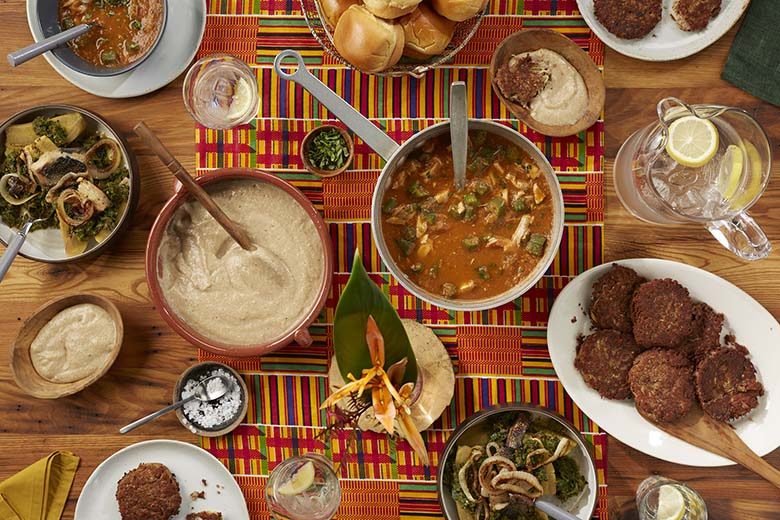
I grew up in Ghana surrounded by crops, livestock and food. My dad, the son of peasant farmers, used every available space on his 2-acre plot of land on the outskirts of Central Accra to grow food and rear livestock. We grew corn, yams, plantains, leafy green vegetables, tomatoes and okra; we also had coconuts, oranges, black tamarind, tangerines, lime, avocado and guavas. We reared pigs, goats, ducks, free-range chicken as well as some raised in a hen coop, and even had a litter of about 16 dogs.
I recall being involved with livestock feeding from a very early age. Being a large family, we mostly ate what we grew and raised. Ours was the typical Ghanaian home of that era, where in addition to the nuclear family (my parents and five children), there were aunties, uncles, cousins, grandparents and a host of others living in the same household.
During festive seasons like Christmas and Easter, we gave away lots of food as gifts to less fortunate families. We hardly sold any of our produce for extra money, as both parents were gainfully employed: my dad a banker and my mum a high school teacher. Like most traditional Ghanaian meals, ours were planned around starchy staples such as cereals, roots and tubers, with vegetable sauces, soups and gravies as accompaniments.
Meals and Eating Patterns
Ghanaians typically consume three meals a day, with each served as a one-course meal. A recent development in the Ghanaian meal pattern is the trend of multiplecourse meals with buffet-style dining during festive occasions such as baby christening events, weddings (usually at a chapel with a minister) and traditional marriages at home with elders in attendance to perform customary rites.
Breakfast has traditionally consisted of cereal (mainly maize and millet), porridges and teas or cocoa beverages. Different types of breads are a popular breakfast accompaniment in most Ghanaian homes, regardless of socioeconomic class. Milk, margarine, butter, fried eggs, salads and cheese also may be accompaniments, but not all households are able to afford them. Some people also prefer heavier meals such as waakye (rice and beans) or kenkey (thick paste made of fermented milled maize) accompanied by tomato gravies and spicy sauces, plus an assortment of animal-source proteins such as eggs and meat for breakfast.
Breakfast meals are prepared at home or purchased from food vendors, which typically are table-top street merchants positioned at vantage points such as bus stops, lorry stations and near schools throughout cities and peri-urban communities. An emerging trend in most urban areas is commercially produced and packaged breakfast foods for sale. These packaged foods, such as sandwiches, pancakes and doughnuts, are usually more expensive and likely to be purchased by the middle class.
Lunchtime in Ghana is very important. People of all ages take a break from work, school and other activities to savor local Ghanaian dishes, mostly eaten outside the home. A lunch time meal in some urban areas can easily pack several hundreds to even a thousand or more calories. Often referred to as heavier foods, some common lunch meals include ampesi (boiled yam or plantain) with vegetable stew, fufu (pounded boiled cassava and plantain) with different types of soups, and all sorts of rice meals with sauces and gravies.
Suppertime meals are similar to lunch and, depending on the household, may be the only opportunity a family has to sit and eat together. In some rural homes, it is common for several family members to eat from the same pot.
Spicy and Flavorful
If there were a single phrase to describe Ghanaian foods, it would be “spicy and flavorful.” Nearly all Ghanaian foods, from porridges to local beverages to sauces and soups, are fiery and zesty in taste. Peppers of all kinds, ginger, cloves, garlic, aniseed, rosemary and mint are common. Chefs and food vendors ensure that visitors are left with a lasting taste of Ghana on their taste buds, a taste that is undoubtedly an essential element of the proverbial Ghanaian hospitality.
Western Influences and the Role of Dietitians
Like most developing countries in Sub-Saharan Africa, Ghana is going through an economic and nutrition transition characterized by an increase in the prevalence of obesity and obesity-related illness &emdash; such as cardiovascular disease, Type 2 diabetes mellitus, hypertension and some forms of cancers &emdash; among adults, especially urban dwellers. This could be attributed to a myriad of factors including globalization, migration and an influx of inexpensive foods that are energy-dense and low in nutrients.
Significant among factors related to globalization is the emergence of several multinational fast-food chains, which are quickly becoming a common sight in Accra and other big cities such as Kumasi and Takoradi. This is leading to a gradual shift from traditional Ghanaian foods to energy-dense foods that are low in nutrients.
Ghanaian health professionals, particularly dietitians, have a critical role in planning and implementing effective nutrition education programs to help control the upsurge of non-communicable diseases. In 2004, the University of Ghana was the first institution to start training dietitians; now, there are four institutions training dietitians at the undergraduate and graduate levels. More than 150 trained dietitians work in the private and public sectors, where they promote healthy eating with a focus on choosing locally available foods and education on healthier food preparation methods.
Try these recipes inspired by traditional Ghanaian dishes: Millet Porridge with Black-Eyed Pea Patties; Spicy Collard Green Sauce with Herring; and Chicken and Fish Soup with Vegetables
Reference
Ofori-Asenso R, Agyeman AA, Laar A, Boateng D. Overweight and obesity epidemic in Ghana-a systematic review and meta-analysis. BMC Public Health. 2016;16(1):1239. Published December 9, 2016. doi:10.1186/s12889-016-3901-4.
